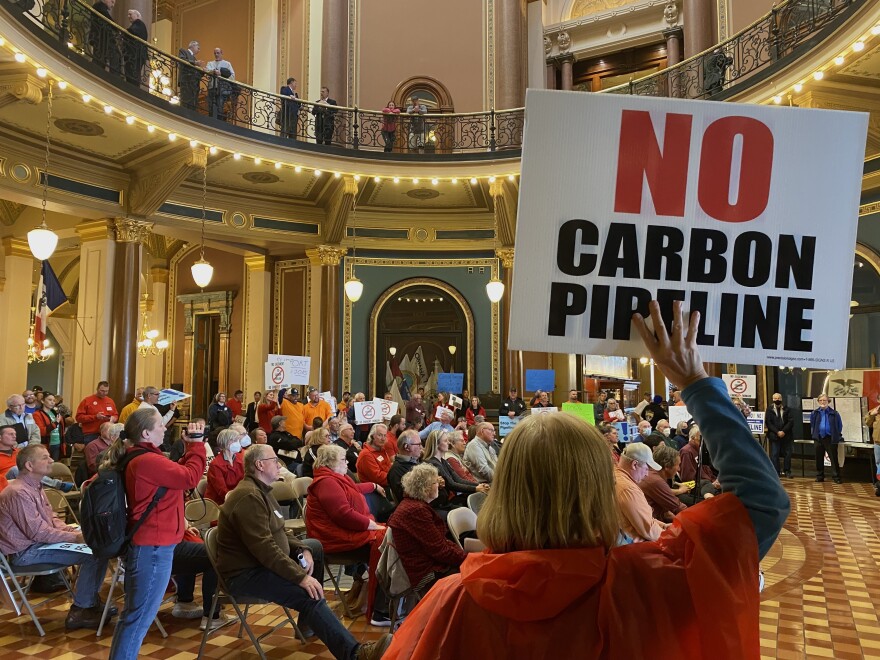There is an ongoing battle over a carbon-capture pipeline that Summit Carbon Solutions is attempting to get approval to build. Essentially, a carbon-capture pipeline takes carbon dioxide emitted by industrial plants, compresses it into a liquid-form and then transports it deep underground for storage. This pipeline would stretch across five states, including Iowa, South Dakota, North Dakota, Nebraska and Minnesota. However, it has raised controversy that has put the project in jeopardy.
This project has faced bipartisan opposition. Environmental groups such as the Sierra Club of Iowa have joined with the ACLU and House Republicans and Democrats. There are different reasons people oppose these pipelines, from safety concerns to the pipeline not going far enough to address climate change. However, one particular objection to the Summit pipeline has been the main factor uniting all these sides: the use of eminent domain. A Des Moines Register poll in March of 2023 found that 82% of Iowa Democrats and 72% of Iowa Republicans oppose the use of eminent domain for carbon pipelines.
As of Jan. 31, 2024, Summit claims that 75% of landowners along its proposed route in Iowa have signed voluntary easements, according to Jared Strong of the Iowa Capital Dispatch. However, the company has requested the use of eminent domain to complete the route of the pipeline.
Eminent domain is the ability of the government to take private property for public use, provided they give just compensation to the landowners displaced. This is based on part of the Fifth Amendment, which reads, “… nor shall private property be taken for public use, without just compensation.”
Summit has claimed their pipeline project would allow for the use of eminent domain because it benefits Iowa economically and reduces carbon emissions. However, opponents have argued that eminent domain should not be used in this instance, suggesting it has limited public use and its purpose is private gain.
For most of U.S. history, eminent domain was mainly restricted to what we would consider public use, such as roads and parks. Later, exceptions were made for private entities for certain types of projects such as railroads and transmission lines, but with strict regulations.
However, in 1954, the Supreme Court provided a massive expansion to eminent domain in the case Berman v. Parker. It expanded the definition of public use in the Fifth Amendment to public purpose. This may seem like a small change, but it allowed the government to seize property that benefited the public, instead of strictly for public use. Private companies could now redevelop areas using the arm of the government. This led to local governments declaring certain areas as slums or blights in order to redevelop them. The definition of blight was very vague, and essentially gave the government the right to take any property if they could build something that would generate more income for the locale.
In 1981, Poletown Neighborhood Council v. City of Detroit, decided by the Michigan Supreme Court, allowed Detroit to seize the working-class neighborhood of Poletown to build a General Motors Plant. This decision was later overruled in the decision County of Wayne v. Hathcock, which found that the pursuit of profit by a private company was not a valid reason to use eminent domain, even if it benefited the public.
However, an even more expansive ruling from the U.S. Supreme Court came in 2006. In the decision Kelo v. City of New London, the Supreme Court ruled that the city of New London could take property from landowners for private development if it could benefit the public economically.
Since the Kelo decision, many states have made laws with harsher restrictions on the use of eminent domain, including Iowa. In 2019, the Iowa Supreme Court rejected the arguments of Kelo in a case involving the use of eminent domain for an oil pipeline called the Dakota Access pipeline. However, they still allowed the use of eminent domain on the grounds that it was a common carrier, similar to a railroad or public utility.
The danger with the expansion of eminent domain in Kelo is that it removes most limits on the government taking private property. Essentially, if they can provide a reason that taking land would benefit the public, they can take entire neighborhoods. While this may seem like it could be a good thing, it doesn’t specify what counts as a public purpose. If the government decides that a neighborhood would be more profitable in the hands of a private developer, they can uproot it. There may be little the landowners can do about it, depending on that state’s laws.
Justice Sandra Day O’Connor pointed this out in her dissent to Kelo by saying, “The specter of condemnation hangs over all property. Nothing is to prevent the State from replacing any Motel 6 with a Ritz-Carlton, any home with a shopping mall, or any farm with a factory.” If the government decides it is in the public purpose to redistribute land to favored groups or give private land to wealthy corporations, then this ruling would potentially allow it.
Providing the government with this kind of power does not align with the foundation of American liberties. John Locke was a British philosopher who had a tremendous influence on many of our Founding Fathers, including Thomas Jefferson. He believed that people have God-given, inalienable rights to life, liberty and property. These are natural rights that every person has that the government did not give and cannot take away.
John Locke’s rhetoric inspired the Declaration of Independence and is reiterated in the Fifth and 14th Amendments. Recognizing the importance of the right of the people to own property, the Founders limited eminent domain in the Fifth Amendment to public use and required just compensation. The more modern reinterpretation of this as public purpose provides a gateway to government abuse of this right.
Dangers from the abuse of eminent domain allow for crony capitalism, or close relationships between government and businesses. These public-private partnerships thwart the principles of competition and free trade and cause failures in a capitalistic market. They can also lead to monopolies due to government favoritism.
America was built on the principles of individualism. One of the reasons the U.S. has been so successful is because the rights of the individual supersede the whims or desires of the collective. However, when whatever a government deems as serving the public purpose is allowed to triumph over the right of the individual, our republic suffers and becomes more centralized.
In regards to the Summit pipeline, there is simply not a great reason why this project for a private entity should have the right to use eminent domain. While it may bring economic benefits, it doesn’t demonstrate any public use. Eminent domain can be necessary in rare cases, but its use should be limited. The abuse of it can have perilous consequences.









